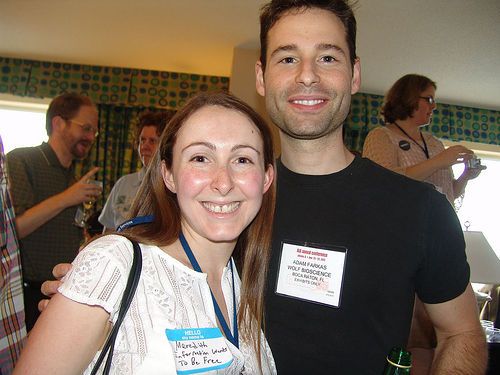OCLC Blogger Salon
This has been covered by
All in all a rockin’ party. If you want to see some great pics, check out Michael Stephens’ flickr page, Jenny Levine’s flickr page, or the great pics of Steven “Zelig” Cohen (and a few others) at It’s all good. Michael Stephens even snapped a picture of me and my hubby, Adam (a sometimes contributor and commentor on this blog).

Me and Adam at the OCLC Blogger Salon (photo by Michael Stephens)
ALA Day 4
Since the rest of the sessions I went to have already been covered, I won’t bother going into detail. Monday’s Google and Libraries session, left me feeling a bit concerned with how in love with Google John Price-Wilkin from the University of Michigan seemed. While the representatives at the other Universities expressed legitimate concerns about working with Google, Michigan didn’t seem to have any (see their contract with Google for more details on the deal). While the others did not see Google Print as a “preservation” project, the Price-Wilkin said that the initiative was about preservation for the University of Michigan. Unfortunately (or unsurprisingly) no one talked about how they were going to preserve these digital surrogates. Contrary to Mr. Price-Wilkin’s statements, digitization is NOT preservation. It’s about providing access. The average lifespan of any file format is approximately three to five years, making it impossible to access the files on contemporary machines without some preservation measures being taken. There are a variety of methods for digital preservation, however all are expensive or time consuming, and all are incomplete solutions. Without employing some form of digital preservation, however, the files will quickly become obsolete and inaccessible. And researchers have suggested that preservation could end up costing a good deal more than the original digitization effort. I’d just like to hear that these schools have some sort of plan for preserving the digital surrogates, because there is no guarantee that Google will stick with it. In addition to the copyright issues and the fact that none of the schools seemed to know what they will do with their own copies, I still have some concerns about this whole thing. Like Roy Tennant, I wonder what impact the Google Print project will have fair use and the funding of other non-Google digitization projects.
That evening, David Sedaris made me laugh so hard I thought I might break a rib.
All in all a great conference, more for the people I met than the sessions I went to.
Sorry it took me so long to cover all this, but I feel like I’ve been sleeping off ALA the past week. 🙂 Or maybe it’s a job search hangover. Or a home-buying hangover. It’s so nice to know I have a job — and a fantastic one at that — but once I got it, then the relocation stress started. I’ve never owned a house, so I feel like I’m learning a whole new language between the realtors and the bankers and the lawyers. On a positive note, it looks like we’ll have our first very own house by the middle of August. And I couldn’t be happier. Things are finally coming together!




For the sake of precision, I will remark that digital preservation is actually two problems. One is physical medium, and the other is file format. Your concerns expressed above actually come closer to concerns about physical medium than file format.
We already have file formats far older than three to five years that are going strong. SGML has been around since the late sixties (being generous, here, but not very). Add the internationalization benefits of XML (itself older than five years, which boggles my mind, as I’ve been working with it almost since its inception, and can it really have been that long?!), and we have something (for text, at least) that simply has no reason to become obsolete.
Physical-medium obsolescence is indeed a problem, but to my mind a migration plan is insurance sufficient for now.
Which is not to say I disagree with your worries. I don’t. I’m hearing from several quarters that the deal for the libraries isn’t as good as I thought it almost had to be, and that bothers me no little.